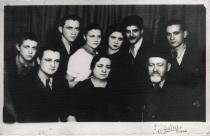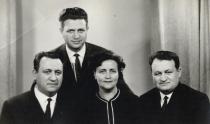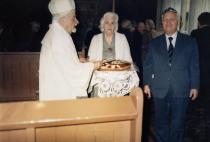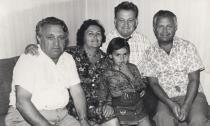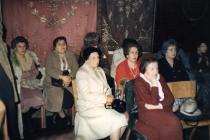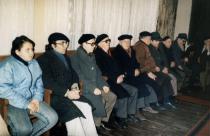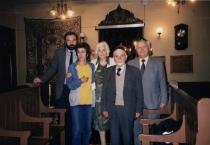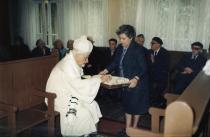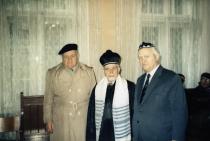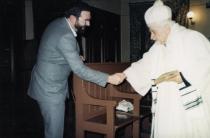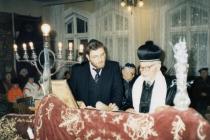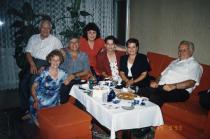This is a picture taken at the synagogue in Sofia in 1988. I am to the right, next to me is haribi Meshulam, then his wife Bela, a stranger, and Jan Solomon. The picture was taken in a small [prayer] room in the synagogue. The big hall of the synagogue was rarely used. This was due to the fact that there weren't many visitors in the synagogue and it was cold in the big hall and was difficult to heat it.
Starting in 1983, as I hadn't forgotten Ivrit yet, I was invited at the synagogue as chairman of the Central Israeli Spiritual Council. During the totalitarian years the Jewish organizations in Sofia used to be an educational center. It didn't deal with Jewish questions. At that time, 1st May, 9th September, and 7th November were celebrated and these were holidays of the Jewish community in Sofia also. Yet, here, in the synagogue, the status quo was quite better and during this period of time I managed to read lectures about Chanukkah, Pesach, Moses and the migration of Jews from Egypt. Our holidays are most often connected with history, so the Jews in Sofia became aware and began to realize the true meaning of the Jewish history. Besides, I visited quite a lot of conferences of the Jewish World Congress and some other organizations. I was well accepted as I spoke Ivrit well, which was rather uncommon for most of the people there, because most representatives of other countries spoke English. Therefore, my speech in Ivrit was always a huge success.
I was quite efficient in terms of public activities not only for local organizations but also with international Jewish organizations. Yet, when 10th November 1989 came things changed as Shalom took over the international Jewish activities and it was their responsibility to maintain contacts with international Jewish organizations. Actually, from 1983 to 1989 I established a lot of contacts, and provided matzah and other things here, which was quite difficult at that time because the Department of Ecclesiastical Matters had a negative attitude towards religion. There was even a representative who kept a close watch on the quantity of published calendars. It was a great achievement for him if he could report that in the course of years fewer and fewer calendars were issued, which proved the death of religion. Yet, the Jews are a hardy nation and they couldn't vanish so easily.
In totalitarian times people visiting the synagogue were treated as suspicious characters. If an official of Jewish origin was spotted visiting the synagogue, he became a subject of persecution. There wasn't a law forbidding visits to the synagogue, on the contrary, the state financially supported the synagogue. Yet, it was forbidden for children, young people and citizens here. All religions were treated in that way, and this didn't only happen to us. Religion was considered something bad which had to be abolished. There is also another thing: as a whole, the Bulgarian people aren't fanatics concerning religious matters, unlike the Catholics, for example. This could also be one of the reasons that in Bulgaria there weren't large manifestations of anti-Semitism.

